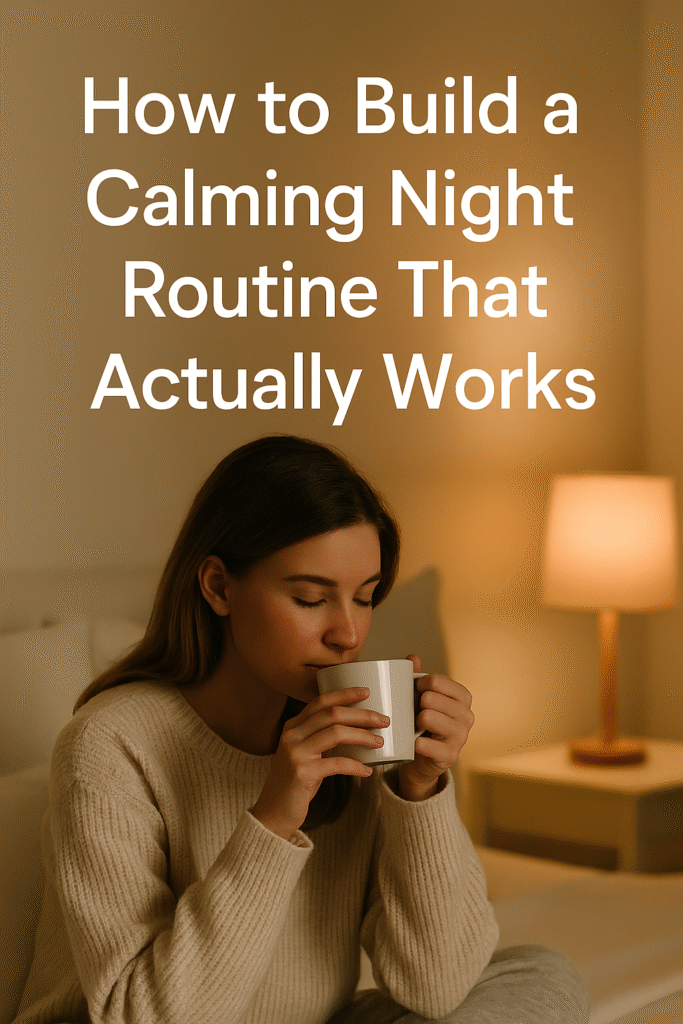Struggling to unwind at night? Learn how to build a calming night routine that actually works, with simple habits to boost relaxation and improve sleep quality.

Are you tired of tossing and turning at night, unable to switch off your brain after a long, busy day? You’re not alone. In our fast-paced world, restful sleep can feel like a luxury—but it doesn’t have to. Creating a calming night routine can transform your evenings from chaotic to peaceful and help you drift off faster and sleep more soundly.
In this post, you’ll learn why bedtime habits matter, how to build a nighttime routine for adults that supports both your body and mind, and what small changes can make a big difference. Let’s dive in.
Table of Contents
Why a Calming Night Routine Matters
Your evening routine plays a critical role in how well you sleep and how refreshed you feel the next day. A consistent nighttime routine:
- Signals your brain that it’s time to unwind
- Helps regulate your circadian rhythm
- Reduces stress hormones like cortisol
- Improves sleep quality and duration
Just like children need structure at bedtime, adults benefit from a series of predictable, relaxing evening habits that promote better sleep hygiene and overall wellness.
Step-by-Step Guide to Building Your Ideal Night Routine
1. Set a Consistent Sleep Schedule
Going to bed and waking up at the same time every day—even on weekends—helps align your body’s internal clock. This habit reinforces a natural sleep-wake cycle, making it easier to fall asleep and wake up feeling energized.
🕰 Tip: Choose a bedtime that allows for at least 7–8 hours of sleep and set a wind-down alarm 60 minutes beforehand.
2. Power Down Electronics
Screens emit blue light, which disrupts melatonin production—the hormone that tells your body it’s time to sleep. Avoid phones, tablets, and TV at least 30–60 minutes before bed.
📵 Instead, try:
- Reading a paperback book
- Journaling about your day
- Listening to calming music or guided meditations
3. Practice Gentle Movement or Stretching
Light physical activity can help you release muscle tension and transition from a high-stress state into relaxation. Incorporating evening yoga or simple stretches can calm your nervous system.
🧘♀️ Try this: A 5-minute bedtime yoga sequence or gentle neck and shoulder stretches.
4. Try Calming Activities
What you do before bed should help you unwind—not stimulate you. Integrate one or two relaxing habits that you genuinely enjoy.
☕ Soothing ideas:
- Sip a cup of herbal tea like chamomile or lavender
- Take a warm epsom salt bath
- Diffuse essential oils like lavender or frankincense
- Practice deep breathing or mindfulness meditation
5. Create a Cozy Sleep Environment
Your bedroom should be a sleep sanctuary. A cluttered, noisy, or brightly lit room sends the wrong signals to your brain.
🛏 Optimize your space:
- Keep it cool (60–67°F is ideal)
- Use blackout curtains or a sleep mask
- Choose soft bedding and limit distractions
- Keep it tidy and tech-free
Tips to Stick to Your Night Routine
Building habits takes time. Here are a few ways to make your new routine stick:
- 📲 Set reminders or alarms for your wind-down time
- 📓 Track your sleep and mood to see what’s working
- ❤️ Be gentle with yourself—some nights won’t go perfectly, and that’s okay
- 🌙 Start small and add on over time (one habit a week is plenty!)
Common Mistakes to Avoid
Even the best intentions can backfire if you’re not careful. Watch out for these pitfalls:
🚫 Overcomplicating your routine
Stick to 3–5 calming activities—avoid turning your night into a checklist.
🚫 Using your phone in bed
Even if you’re reading or listening to music, notifications and blue light can still disturb your sleep signals.
🚫 Eating or working out too close to bedtime
Heavy meals or intense exercise can spike energy when you should be winding down.
Conclusion: Create the Calm You Crave
A calming night routine isn’t just about better sleep—it’s about honoring your body’s need for rest, recovery, and peace. By taking small steps like setting a bedtime, reducing screen time, and doing activities that help you relax, you can create a soothing nightly rhythm that actually works.